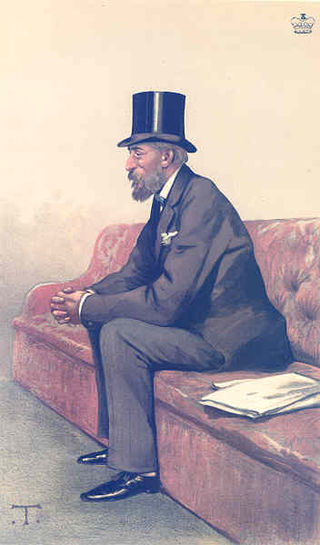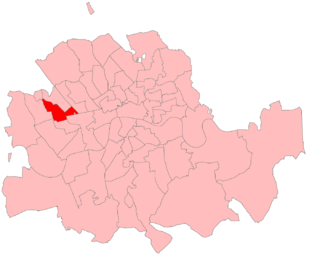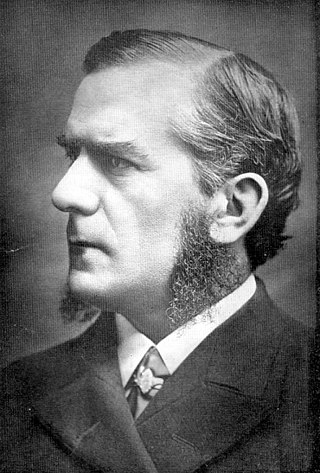Related Research Articles

Ivor Bertie Guest, 1st Baron Wimborne, 2nd Baronet, DL was a British industrialist and a member of the prominent Guest family.

Ivor Churchill Guest, 1st Viscount Wimborne, KP, PC, known as Lord Ashby St Ledgers from 1910 to 1914 and as Lord Wimborne from 1914 to 1918, was a British politician and one of the last Lords Lieutenant of Ireland, serving in that position at the time of the Easter Rising.

Frederick Edward Guest, was a British politician best known for being Chief Whip of Prime Minister David Lloyd George's Coalition Liberal Party, 1917–1921. He was also Secretary of State for Air between 1921 and 1922. He won the bronze medal with the British polo team at the 1924 Summer Olympics in Paris.

Paddington South was a Parliamentary constituency in London which returned one Member of Parliament. It was a compact urban area, but predominantly wealthy, and was most famously represented by Lord Randolph Churchill during the latter part of his career.
Sir Robert William Hamilton was a Scottish Liberal Party politician and Chief Justice of the East Africa Protectorate.

Sir Edward George Clarke, KC was a British barrister and politician, considered one of the leading advocates of the late Victorian era and serving as Solicitor-General in the Conservative government of 1886–1892. His legal career included representing Oscar Wilde in his disastrous prosecution of the Marquess of Queensberry for libel, and representing the plaintiff in the "baccarat case", during which Sir Edward cross-examined the Prince of Wales. He was a member of the anti-women's suffrage movement.

Lieutenant-Colonel Christian Henry Charles Guest, usually known as Henry Guest, was a Liberal Party politician in the United Kingdom.

Oscar Montague Guest was a politician in the United Kingdom, initially with the Liberal Party and later as a Conservative. He was twice elected as a Member of Parliament (MP).
The 1902 Bury by-election was a by-election held in England on 10 May 1902 for the House of Commons constituency of Bury in Lancashire.
Allan Heywood Bright was a British Liberal politician.
The 1903 Rochester by-election was a Parliamentary by-election held on 23 September 1903. The constituency returned one Member of Parliament (MP) to the House of Commons of the United Kingdom, elected by the first past the post voting system.
The 1898 Liverpool Kirkdale by-election was a parliamentary by-election held in England on 9 December 1898 for the British House of Commons constituency of Liverpool Kirkdale.
The 1892 Liverpool Everton by-election was a parliamentary by-election held in England on 15 February 1892 for the British House of Commons constituency of Liverpool Everton.
The 1903 Liverpool West Derby by-election was held on 20 January 1903 after the death of the incumbent Conservative MP Samuel Wasse Higginbottom. It was retained by the Conservative candidate Watson Rutherford.
The 1905 Carlisle by-election was a Parliamentary by-election held on 14 July 1905. The constituency returned one Member of Parliament (MP) to the House of Commons of the United Kingdom, elected by the first past the post voting system.
The 1902 Clitheroe by-election was held on 1 August 1902 after the incumbent Liberal MP Sir Ughtred Kay-Shuttleworth was elevated to the House of Lords. The Labour Representation Committee candidate David Shackleton won the by-election unopposed.
The 1902 Devonport by-election was held on 22 October 1902 after the death of one of the incumbents, Liberal politician E. J. C. Morton. The contest was won by the Conservative Party candidate John Lockie.
The 1900 Edinburgh and St Andrews Universities by-election was a parliamentary by-election held in Scotland on 3 May 1900 for the UK House of Commons constituency of Edinburgh and St Andrews Universities.
The Holborn by-election was a Parliamentary by-election held on 23 March 1900. The constituency returned one Member of Parliament (MP) to the House of Commons of the United Kingdom, elected by the first past the post voting system.
References
- ↑ "House of Commons". leighrayment.com. Archived from the original on 7 June 2008. Retrieved 9 April 2016.
- ↑ "Sir E. Clarke and his constituents". The Times. No. 36061. London. 9 February 1900. p. 6.
- ↑ "Sir Edward Clarke and his constituents". The Times. No. 36062. London. 10 February 1900. p. 8.
- 1 2 "Election intelligence". The Times. No. 36063. London. 12 February 1900. p. 6.
- 1 2 3 4 "Election intelligence". The Times. No. 36064. London. 13 February 1900. p. 8.
- ↑ "Election intelligence". The Times. No. 36068. London. 17 February 1900. p. 9.
- ↑ The Constitutional Year Book, 1904, published by Conservative Central Office, page 172 (196 in web page)